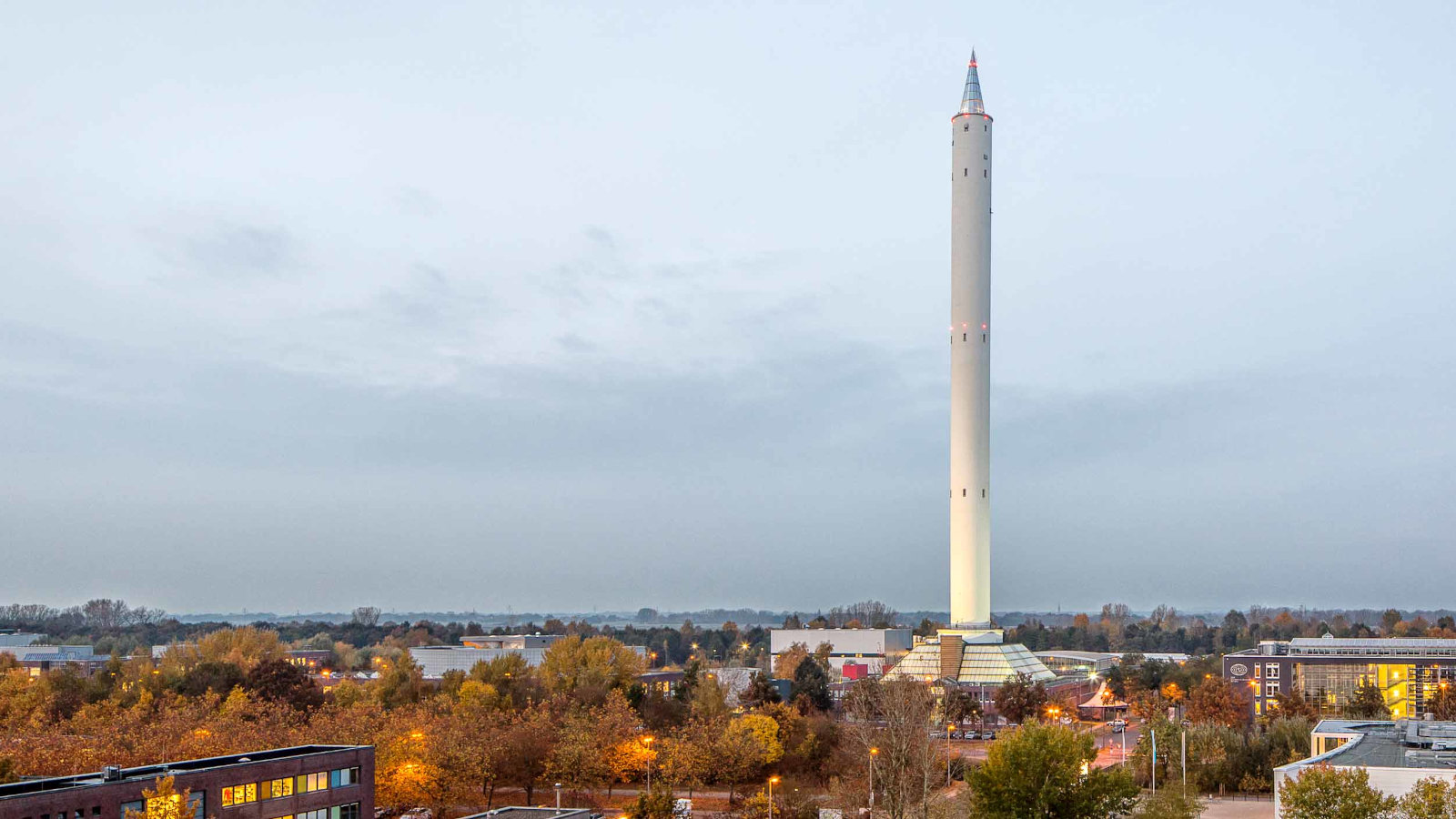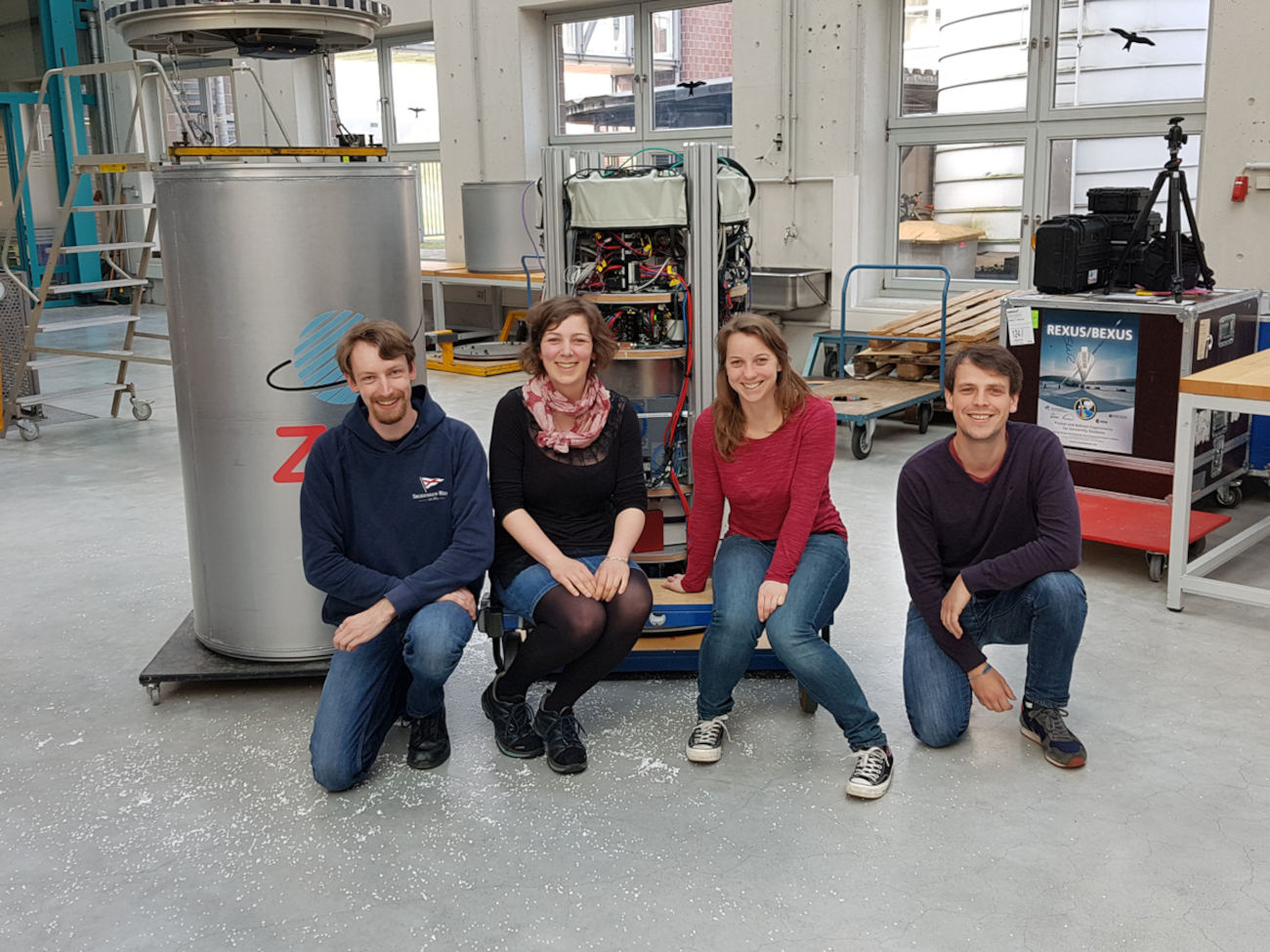
© ZARM
Explain This, Professor: The Coldest Place in the Universe
What, who, why? In the “Explain This, Professor” series, Bremen researchers reveal why they do what they do. Today: How the coldest place in the Universe came to be in Bremen.
In August 2018, Bremen was the coldest place in the universe for two seconds. More precisely, a research capsule about the height of a person in the Drop Tower of the Center of Applied Space Technology and Microgravity (ZARM) set this record. It was a great success for Merle Cornelius, a PhD student from Bremen, and the other members of the QUANTUS collaborative research project. However, the researchers were actually concerned with something quite different.
We are in the year 2018 AD, in the month of August to be exact. All of Bremen is experiencing temperatures between 17 and 28 degrees. All of Bremen? No! An unrelenting research capsule at the Center of Applied Space Technology and Microgravity (ZARM) at the University of Bremen won’t stop getting colder and colder.
Physics PhD student Merle Cornelius and her colleagues in the QUANTUS project – Christian Deppner, Waldemar Herr, Julia Pahl, and Peter Stromberger – are fascinated. They are now dealing with ranges that a conventional thermometer has long given up on. A short time later, it is clear that they have set a record for the lowest temperature. Their experiment was at 38 picokelvin for a moment. That’s a mere 38 trillionths of a degree above absolute zero. Almost three years later, they published their achievement in the Physical Review Letters.
Not Measurable with a Thermometer
The cold temperature record is not measurable with conventional temperature measuring instruments. The stated temperature results solely from the fact that the observed atoms move extremely slowly. In physical terms, temperature is an expression for the movement of particles. All atoms or molecules have an inherent motion and this inherent motion becomes slower and slower the colder it gets. Absolute zero is the state in which particles remain at absolute rest. It can only be reached theoretically. However, the QUANTUS team came pretty close!
© ZARM
How did Merle Cornelius, Christian Deppner, Waldemar Herr, Julia Pahl, and Peter Stromberger get the particles to move at such an extremely slow speed? The whole thing happened in an ultra-cold gas - a so-called Bose-Einstein condensate (BEC). “In a BEC, the individual atoms in an atomic cloud form a single coherent wave of matter, so to speak,” explains Merle Cornelius. The researchers intended to preserve this atomic cloud for as long as possible, as it is what makes it possible to take precise physical measurements in the first place.
Atoms Want to Expand
The difficulty here is that although the BEC is already extremely cold, it still has a low internal energy that drives the atoms apart. Thus, the atomic cloud disintegrates after a short time. “In the lab, we can only observe it for 22 milliseconds, but that’s far too short for the experiments we had in mind,” Cornelius states.
The solution, however, actually lay quite close. To be more precise, it was on the edge of the Bremen campus: the Drop Tower. It has been used for experiments in weightlessness for a good 30 years. In the Drop Tower, researchers were able to manipulate the atomic cloud so that it expanded much more slowly. “We managed to hold the atomic cloud for two seconds, which is extremely long,” Cornelius explains proudly.

© ZARM
Strictly speaking then, the experiment in the Drop Tower was not about a cold record, but about the slowest expanding atomic cloud in the world. Thus, the cold record was a classic byproduct of research. Still, it is “kind of cool,” according to Merle Cornelius. Even if it’s not physically correct to speak of the coldest place in the universe, she adds, because no temperature can be assigned to a BEC. “Nevertheless, it is an important step for us to build on now,” the researcher points out. For example, the time that the atomic cloud lasts could be extended further by conducting the experiments on the International Space Station (ISS) or on a satellite. “Up to 17 seconds should be possible.”
An Age-Old Conflict
And what was the great thing about this atomic cloud again? In a nutshell: With its help, very sensitive measuring instruments, so-called interferometers, can be built. Among other things, these interferometers enable extremely precise navigation, for example in shipping, and they could enable much more precise measurements in the future, for example of the Earth’s gravitational field. “Among other things, this could be used to determine exactly how much ice mass the poles are losing. Changes in groundwater could also be detected,” explains Cornelius.
Another field of application for the interferometers: They can be used to test fundamental physical theories. One of the issues is an age-old conflict between quantum mechanics and the theory of relativity. The question is how universal free fall really is. QUANTUS research could also make a significant contribution to clarifying this physical dispute.
Further Information:
The QUANTUS project is a DLR joint project. In addition to ZARM, researchers from Leibniz Universität Hannover, Humboldt-Universität zu Berlin, and Johannes Gutenberg University Mainz are involved. The project is supported by the Centre for Quantum Engineering and Space-Time Research (QUEST) and the German Excellence Strategy “EXC 2123 QuantumFrontiers” of the German Research Foundation (DFG).
More information on the Bremen Drop Tower is available on the ZARM website.